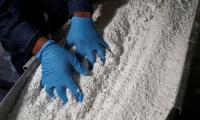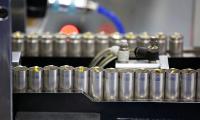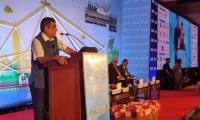KPIT Unveils India's First Sodium-Ion Battery Tech
KPIT Technologies unveils India's first sodium-ion battery technology, aiming to generate revenue within a year. The tech promises lower costs, faster charging, and enhanced safety compared to lithium-ion batteries.
Pune, Dec 12 (PTI) In a country-first, KPIT Technologies unveiled sodium-ion battery technology on Tuesday.
The technology, developed in-house by researchers at the city-based company over the last eight years, will be put through external testing, and deliver revenues after a year, its co-founder and chairman Ravi Pandit told reporters here.
He said some revenues will come from the testing phase as well, but the core licensing fees which will accrue from the technology will start in a year.
KPIT's core business of providing software-based solutions to the auto industry will continue to be the revenue mainstay even in the future, Pandit said.
He said the company hired electrochemists for the project, which is a departure from employing software engineers that has been the norm for them. It tested a slew of chemistries before narrowing down on the more widely available sodium, Pandit said, adding that the use of the compound also delivers other advantages.
These include the ability to charge a vehicle for shorter trips in less than half an hour, thus making it more cost-effective and also more remunerative for the driver as more trips can be undertaken on the same vehicle in a day.
The overall cost of the battery will be up to 30 per cent lower than the present alternatives, and the company is in talks with both existing auto industry clients as well as those interested in other applications of energy storage, Pandit said.
With the conventional lithium-ion or lead-acid batteries that are used in EVs reporting a slew of accidents, Pandit claimed the sodium-ion-based technology developed by the company is safer.
In the development stage, the technology has been tested internally in a smaller group and in the next phase which lasts about 6-9 months, it will be tested on select vehicles outside, Pandit said, adding that after this it will be fully commercial.
He claimed KPIT is the first company in India to come out with the technology, and only fourth in the world to possess a proven technology solution for sodium-ion battery storage.
The UK-based Faradion, one of the four companies globally to have similar capabilities, was bought by Reliance Industries for USD 135 million last year. Pandit declined to comment on the money spent on the research and development of the technology, which can lead to the manufacturing of batteries which will have 80 per cent up to 5,000 cycles.
The company's head said it will also help reduce reliance on imported batteries and exuded confidence that it will be able to form partnerships with local firms.
Battery manufacturing can also qualify under the government's production-linked incentive scheme, Pandit said, adding that there is also a proposal to give up to 40 per cent subsidy on investments in setting up capacities for alternate chemistries which will also help.
The company will also be marketing the technology in export markets, he said, counting on Europe and East Asia as the biggest opportunities.
Scrip of KPIT settled 2.08 per cent lower at Rs 1,432.75 apiece on the BSE.
The technology, developed in-house by researchers at the city-based company over the last eight years, will be put through external testing, and deliver revenues after a year, its co-founder and chairman Ravi Pandit told reporters here.
He said some revenues will come from the testing phase as well, but the core licensing fees which will accrue from the technology will start in a year.
KPIT's core business of providing software-based solutions to the auto industry will continue to be the revenue mainstay even in the future, Pandit said.
He said the company hired electrochemists for the project, which is a departure from employing software engineers that has been the norm for them. It tested a slew of chemistries before narrowing down on the more widely available sodium, Pandit said, adding that the use of the compound also delivers other advantages.
These include the ability to charge a vehicle for shorter trips in less than half an hour, thus making it more cost-effective and also more remunerative for the driver as more trips can be undertaken on the same vehicle in a day.
The overall cost of the battery will be up to 30 per cent lower than the present alternatives, and the company is in talks with both existing auto industry clients as well as those interested in other applications of energy storage, Pandit said.
With the conventional lithium-ion or lead-acid batteries that are used in EVs reporting a slew of accidents, Pandit claimed the sodium-ion-based technology developed by the company is safer.
In the development stage, the technology has been tested internally in a smaller group and in the next phase which lasts about 6-9 months, it will be tested on select vehicles outside, Pandit said, adding that after this it will be fully commercial.
He claimed KPIT is the first company in India to come out with the technology, and only fourth in the world to possess a proven technology solution for sodium-ion battery storage.
The UK-based Faradion, one of the four companies globally to have similar capabilities, was bought by Reliance Industries for USD 135 million last year. Pandit declined to comment on the money spent on the research and development of the technology, which can lead to the manufacturing of batteries which will have 80 per cent up to 5,000 cycles.
The company's head said it will also help reduce reliance on imported batteries and exuded confidence that it will be able to form partnerships with local firms.
Battery manufacturing can also qualify under the government's production-linked incentive scheme, Pandit said, adding that there is also a proposal to give up to 40 per cent subsidy on investments in setting up capacities for alternate chemistries which will also help.
The company will also be marketing the technology in export markets, he said, counting on Europe and East Asia as the biggest opportunities.
Scrip of KPIT settled 2.08 per cent lower at Rs 1,432.75 apiece on the BSE.
You May Like To Read
TODAY'S MOST TRADED COMPANIES
- Company Name
- Price
- Volume
- Alstone-Textiles
- 0.31 (+ 3.33)
- 100619449
- Vodafone-Idea-L
- 10.73 (+ 4.28)
- 72234499
- Mehai-Technology
- 1.83 (+ 3.98)
- 38004435
- Spicejet-Ltd
- 34.31 (+ 5.57)
- 36230618
- Murae-Organisor
- 0.28 (+ 3.70)
- 34430827





